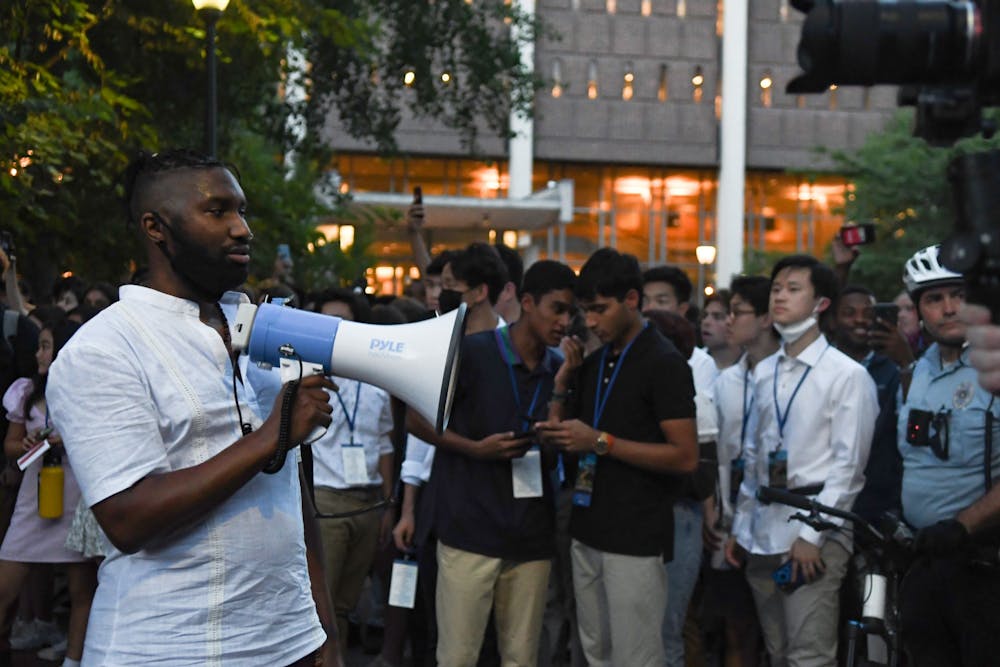
Protests are undoubtedly an extra-legal characteristic of our democracy and Anglo American political tradition. Mobs were used as means of civic engagement in England and later colonial America, and were often considered a routine, if not always approved and appreciated, way for people to voice their grievances. Nevertheless, it would be ignorant and untruthful to say that all protests are created equal in their intention, delivery, and impact.
In his piece, “The Moral Economy of the English Crowd in the Eighteenth Century,” historian E. P. Thompson holds that a riot with merits is one that is “disciplined and with clear objectives.” Activists throughout history have sometimes failed to deliver on this quality.
The recent protest by the Coalition to Save the UC Townhomes at Penn’s Class of 2026 Convocation has brought about conversations regarding the merit and legitimacy of various forms of activism all around campus. The protest, which interrupted new President Liz Magill midway through her speech at Convocation and continued on until the end of Convocation, brought on mixed reactions from first years, many of whom were deeply frustrated about their convocation being taken from them.
College first year Krystof Purtell expressed his concerns with the actions of the protestors, stating that “I think Convocation is a core tradition of the Penn college experience, and it was stripped away from us. The protesters clearly intended to end Convocation, not just get their message heard, considering they continued for so long. They should’ve eventually stopped; I don’t see how they benefited by continuing despite jeers from the crowd and clear disinterest from much of the class.”
As a student in the Class of 2024 who had her own Convocation, among many other pinnacle Penn first-year experiences, stripped from her by the COVID-19 pandemic, I sympathize with Purtell’s dismay. Convocation is extremely trivial compared to people losing their homes, however, so the question then arises: Was the coalition’s Convocation disruption meaningful? And did the protest have “clear objectives” beyond disruption?
Despite obvious consequences for the students whose Convocation was interrupted, the protestors succeed in doing something that could have only been delivered at a first-year event — awakening an entire class of students before their very first day of class. Wharton first year Adrian Rafizadeh, reflecting on the success of the protest, said, “I think that the protestors achieved their goal — start a conversation about the issue, identify supporters, and rally them to take action. No incoming freshman knew about it prior to the protest. Afterward, it got us all talking.”
While informing the first-year students of their place in the broader Philadelphia community, which Penn notoriously neglects, is a valiant cause, it is important to do so in a way that is truthful and motivates them to feel a calling for activism rather than breeding resentment.
A commonly held misconception regarding the UC Townhomes is that they are owned by Penn. The signs held by protestors at convocation certainly said as much: “PENN is DISPLACING BLACK FAMILIES.” But the townhomes are, in fact, privately owned, and the displacement which is motivating the protests is rooted in the discontinuation of a federal affordable housing contract and the current owner of the UC Townhomes’ plan to sell the property.
That being said, there is no doubt that an argument is to be made for the role Penn has historically played in the gentrification (or “Penntrification,” as it is referred to on campus) of West Philadelphia, notably by purchasing more and more property around campus. Simultaneously, it is true that Penn is the largest employer in the city, holding a wide sphere of political and economic influence, and that it operates as a 501(c)(3) organization with tax-exempt status.
As a result, protesters and organizers have expressed their desire to hold Penn accountable for what they see as their historic mistreatment of the community, despite not owning the townhomes themselves. This is a reasonable and fair goal, but yet seems inconsistent with the protest itself, given it was directed at people who hold no responsibility for Penn’s previous actions. The students who lost their Convocation, and Magill, who has only been president for a few short months, have played no role in the institutional faults of the University. They simultaneously haven’t had the opportunity to prove themselves, or what they can do to better the West Philadelphia community.
At the same time, getting an audience with an acknowledgment by Magill may be valuable in the public relations of the coalition’s cause, but fails to help deliver concrete action on the issue. Magill, whether she might want to or not, does not have the power herself to purchase the townhomes, or change city policy. Rather, protests like the one the coalition organized last week at City Hall, are more likely to deliver concrete responses, such as the joint statement signed by City Councilmembers Helen Gym and Kendra Brooks.
The reality is that civic engagement without disruption is unrealistic, ineffectual, and un-American. However, that should not resolve us to overlook how to effectively deliver our desired solutions in a “disciplined” way with “clear objectives."
LEXI BOCCUZZI is a College junior studying philosophy, politics, and economics from Stamford, Conn. Her email is boccuzzi@thedp.com.
The Daily Pennsylvanian is an independent, student-run newspaper. Please consider making a donation to support the coverage that shapes the University. Your generosity ensures a future of strong journalism at Penn.
Donate






